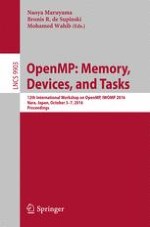2016 | Buch
OpenMP: Memory, Devices, and Tasks
12th International Workshop on OpenMP, IWOMP 2016, Nara, Japan, October 5-7, 2016, Proceedings
herausgegeben von: Naoya Maruyama, Bronis R. de Supinski, Mohamed Wahib
Verlag: Springer International Publishing
Buchreihe : Lecture Notes in Computer Science
